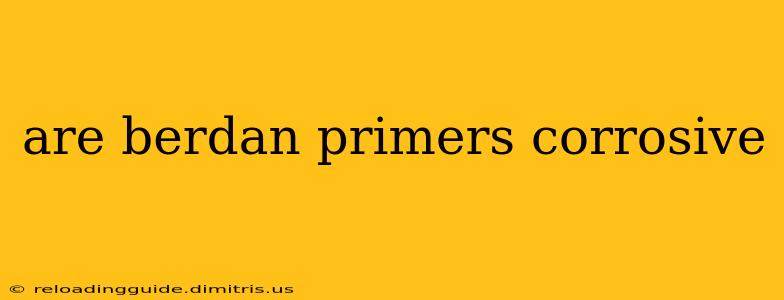The question of whether Berdan primers are corrosive is a complex one, often misunderstood by both novice and experienced reloaders. The short answer is: not inherently, but potentially. Let's delve into the details to understand why.
Understanding Berdan and Boxer Primers
Before addressing corrosiveness, it's crucial to understand the difference between Berdan and Boxer primers, the two primary types used in ammunition.
-
Boxer Primers: These primers have a single flash hole in the cup's center. The anvil is integrated into the primer cup itself. This design makes Boxer primers relatively easy to remove from spent cases using a standard decapping pin.
-
Berdan Primers: These primers have two small flash holes located on opposite sides of the primer cup. The anvil is a separate piece located within the primer cup. This design requires a special Berdan decapping pin to remove them from spent cases, as the anvil is not directly impacted by a standard decapping pin.
The Corrosiveness Question: It's About the Chemicals
The corrosiveness isn't directly tied to whether a primer is Berdan or Boxer. Instead, it hinges on the chemical composition of the primer mixture. Both Berdan and Boxer primers can be made with corrosive or non-corrosive formulations. Historically, many Berdan primers were corrosive, employing chemicals like potassium chlorate, which leave behind residue that can damage firearm components if not thoroughly cleaned.
However, modern ammunition manufacturing trends strongly favor non-corrosive primers, regardless of whether they're Berdan or Boxer. Most commercially produced ammunition today utilizes non-corrosive formulations. The presence of corrosive chemicals is less a matter of primer type and more a matter of manufacturer and production date.
Identifying Corrosive Primers
Identifying whether a specific batch of primers is corrosive can be tricky. There isn't usually a clear label stating "corrosive" or "non-corrosive." The best way to ensure you're using non-corrosive primers is to:
- Buy from reputable manufacturers: Major ammunition manufacturers generally use non-corrosive formulations in their modern production.
- Check the ammunition packaging: Some packaging may provide hints, but this is not always consistent.
- Consult online resources and forums: Experienced reloaders often share their experiences and knowledge regarding specific primer brands and batches.
Cleaning and Maintenance: The Key to Preventing Corrosion
Regardless of whether your primers are Berdan or Boxer, or if they're supposedly non-corrosive, thorough cleaning after shooting is crucial. Always clean your firearm thoroughly after use, paying special attention to the firing pin channel and breech face. This preventative measure mitigates any potential corrosion, regardless of the primer type.
Conclusion: Focus on Non-Corrosive Practice
While Berdan primers have a historical association with corrosiveness due to older formulations, modern manufacturing prioritizes non-corrosive components. The best approach is to prioritize purchasing primers from reputable manufacturers and always adhere to thorough cleaning procedures after shooting to safeguard your firearms. The type of primer (Berdan or Boxer) is less important than the specific chemical composition of the primer mixture itself.

